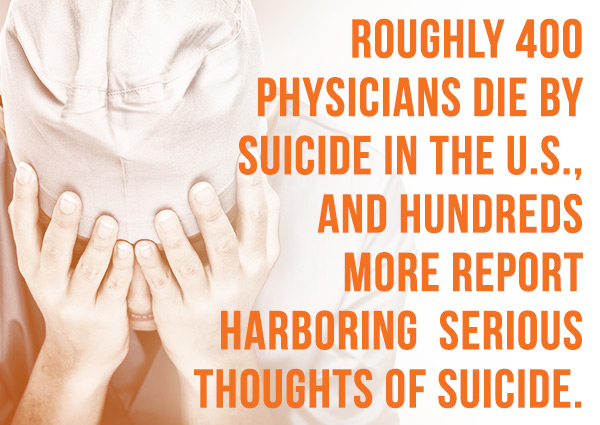Keeping Up With Clinical Risk Management:
 A Quarterly Publication by Danielle Donovan
A Quarterly Publication by Danielle Donovan
Spring 2021
Keeping Up With Clinical Risk Management:
Supporting Your Healthcare Providers through the Stress of Litigation
May 26, 2021
 A Quarterly Publication by Danielle Donovan
A Quarterly Publication by Danielle DonovanSpring 2021
Regardless of where a healthcare professional may be in their career, defending the care they provided in a medical malpractice case can be an extremely stressful, emotionally demanding, and lengthy process. According to a 2001 study, more than 95% of physicians being sued experience emotional distress during some and/or all parts of the litigation process. This may begin immediately on being served with the complaint, including a sense of outrage, shock, or dread similar to those accompanying any major life event. The psychological impact of litigation may not only affect their professional lives and the current or future patients they treat, but could flow into their personal lives and affect the relationships they hold. Organizations can help support their clinicians involved in litigation by developing programs and/or providing them with supportive tools to cope, recover, and regain confidence in their clinical abilities.
Walk Through the Process
According to the American Hospital Association’s Physician Alliance, “Distressed physicians are more likely to leave an organization, or even the profession, leading to significant turnover costs.” Typically, those working within legal and risk management are the first to receive notice of an actual or pending lawsuit. Depending on how your healthcare providers are insured, having one main point of contact, whether within or outside the organization, can be extremely beneficial for those involved in litigation. Consider developing a process in which healthcare providers are counseled and coached one-on-one about expectations after receiving a subpoena or being named in a lawsuit. Provide takeaway documents, such as an FAQ that explains the litigation process, steps involved, time commitment, and offers a contact for additional questions.
Use Your Defense Counsel’s Expertise
Not only is preparation key to the case’s success, but it can also help ease an involved provider’s stress and increase their confidence. Many defense attorneys will coach providers on the details of the legal process and answer any questions. Some firms may also have a network of providers that they previously represented, survived the process, and are willing to be a support for others. With potential limitations on who the involved provider may discuss the case with, a supportive peer though defense counsel may provide additional protections.

Set Up Peer/Social Support
Whether the healthcare professional involved is a nurse, physician, pharmacist, social worker, etc., identify a peer champion with strong communication skills who has experienced the emotional stress and toll that litigation inflicts and can offer face-to-face interaction and support. Sara C Charles writes in the Western Journal of Medicine, “As with any major life event, physicians need to share their feelings and reactions with someone who is trustworthy, understanding, and sensitive to their concerns during what is, for some, the most stressful period of their entire life.” Consider developing a formal support infrastructure of trained clinicians and non-clinicians who can reach out to colleagues in need of personal assistance, such as chaplains, social workers, employee assistance programs, and wellness personnel. When developing a peer support program, involve members of risk management and legal counsel to advise on legal protections for those peer supporters.
Promote Your Employee Assistance Program (EAP)
Employee assistance programs can help employees identify and address a wide range of health, financial, and social issues, including mental and substance use disorders. Although 97% of large employers offer some form of an EAP, the usage among employees has historically been low. EAP services may be a great option for clinicians seeking support, yet do not feel comfortable discussing with a peer. Provide clinicians information about available EAP services, such as access to counseling sessions, at the initial onset of litigation. For more information, see Parker, Smith & Feek’s recent article, Why You Should Promote Your Employee Assistance Program.
Engage Professional Liability Carriers
Many professional liability carriers offer benefits to their insureds, including support programs to those involved in a lawsuit. Programs may include visits with a network of experts who can provide emotional and behavioral counseling, consultation, and referrals.
Share Various Resources and Tools
Not all providers will be comfortable with peer support or one-on-one counseling and will look for a more individual, self-paced resource. Physician’s Litigation Stress Resource Center is a great repository of online resources, including videos, white papers, and tools to navigate the legal process. Several professional societies and national programs also offer various resources for providers to utilize, such as the American Hospital Society (AHA) Well-being Playbook.
Healthcare can be an extremely rewarding, yet stressful career. Sadly, each year roughly 400 physicians die by suicide in the U.S., and hundreds more report harboring serious thoughts of suicide. With healthcare professionals already feeling the stress, burnout, and trauma of the pandemic over the past year, organizations should explore various ways to offer supportive interventions and wellbeing programs, especially for those involved in litigation.
For more information on resources available to healthcare professionals involved in litigation, please reach out to Parker, Smith & Feek.
 Danielle Donovan is Parker, Smith & Feek’s Clinical Risk Manager, dedicated to helping improve our healthcare clients’ operations and mitigate risks. She publishes regular articles to support this effort and provide unbiased advice on issues facing all types of healthcare organizations. Stay tuned for her next installment, and contact Parker, Smith & Feek’s Healthcare Practice Group if you would like to learn more.
Danielle Donovan is Parker, Smith & Feek’s Clinical Risk Manager, dedicated to helping improve our healthcare clients’ operations and mitigate risks. She publishes regular articles to support this effort and provide unbiased advice on issues facing all types of healthcare organizations. Stay tuned for her next installment, and contact Parker, Smith & Feek’s Healthcare Practice Group if you would like to learn more.
Resources and References
- Coping With a Medical Malpractice Suit. National Center for Biotechnology Information, www.ncbi.nlm.nih.gov/pmc/articles/PMC1071237
- Peer Support: Healthcare Professionals Supporting Each Other After Adverse Medical Events, pubmed.ncbi.nlm.nih.gov/18678720/
- Preventing Physician Suicide: Center for WorkLife Wellbeing. American Hospital Association, https://www.aha.org/case-studies/2020-01-29-preventing-physician-suicide-center-worklife-wellbeing
- Shining a light on physician suicide. American Hospital Association, https://www.aha.org/news/blog/2020-09-17-shining-light-physician-suicide
- The Physician Litigation Stress Resource Center, www.physicianlitigationstress.org
- Mitigate the Effects of Emotional Stressors Through Peer Support, AMA Ed Hub, https://edhub.ama-assn.org/steps-forward/module/2767766
- The Clinician Well-being Playbook. American Hospital Association, https://www.aha.org/physicians/well-playbook
The views and opinions expressed within are those of the author(s) and do not necessarily reflect the official policy or position of Parker, Smith & Feek. While every effort has been taken in compiling this information to ensure that its contents are totally accurate, neither the publisher nor the author can accept liability for any inaccuracies or changed circumstances of any information herein or for the consequences of any reliance placed upon it.



